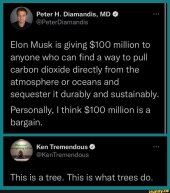svetz
Works in theory! Practice? That's something else
No kids or pets isn't a solution I'd support, I'd be in favor of one of the plan Bs long before then. That doesn't seem so much like a solution as it does hysteria.
If a couple has two kids, then then the population stays the same. Not all will have two. For example, in the U.S., the average is currently 1.9 kids per family which is up from prior years. That is, by itself the population would be naturally declining.
I'm not saying over-population isn't a problem in a lot of countries, but the IPCC reports takes into account population growth in their report. From what I've seen there is still time to fix the climate change issues without such measures.
I suspect a workable plan isn't going to be one that requires a lot of austerity (e.g., everyone giving up air conditioning). It'll be something like solar which is not only green but cheaper than fossil fuels. If it takes more than that, plan on voters approving a Plan B.
If a couple has two kids, then then the population stays the same. Not all will have two. For example, in the U.S., the average is currently 1.9 kids per family which is up from prior years. That is, by itself the population would be naturally declining.
I'm not saying over-population isn't a problem in a lot of countries, but the IPCC reports takes into account population growth in their report. From what I've seen there is still time to fix the climate change issues without such measures.
I suspect a workable plan isn't going to be one that requires a lot of austerity (e.g., everyone giving up air conditioning). It'll be something like solar which is not only green but cheaper than fossil fuels. If it takes more than that, plan on voters approving a Plan B.
Last edited:




